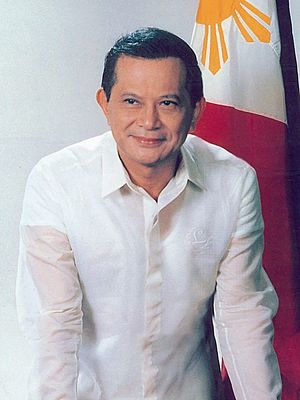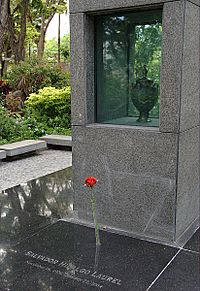Salvador Laurel facts for kids
Quick facts for kids
Salvador H. Laurel
GCrL GCrM KGCR
|
|
|---|---|
 |
|
| 8th Vice President of the Philippines | |
| In office February 25, 1986 – June 30, 1992 |
|
| President | Corazon Aquino |
| Preceded by | Re-established Title last held by Fernando Lopez (de jure) Arturo Tolentino (de facto) |
| Succeeded by | Joseph Estrada |
| 5th Prime Minister of the Philippines | |
| In office February 25, 1986 – March 25, 1986 |
|
| President | Corazon Aquino |
| Preceded by | Cesar Virata |
| Succeeded by | Position abolished |
| Secretary of Foreign Affairs | |
| In office March 25, 1986 – February 2, 1987 |
|
| President | Corazon Aquino |
| Preceded by | Pacifico A. Castro (Acting) |
| Succeeded by | Manuel Yan |
| Member of the Interim Batasang Pambansa from Region IV-A | |
| In office June 12, 1978 – September 16, 1983 |
|
| Senator of the Philippines | |
| In office December 30, 1967 – September 23, 1972 |
|
| Personal details | |
| Born |
Salvador Roman Hidalgo Laurel
November 18, 1928 Paco, Manila, Philippine Islands |
| Died | January 27, 2004 (aged 75) Atherton, California, U.S. |
| Resting place | Libingan ng mga Bayani |
| Political party | Nacionalista |
| Other political affiliations |
Kilusang Bagong Lipunan (1978–1979) UNIDO (1980–1988) |
| Spouse |
Celia Díaz
(m. 1950; d. 2004) |
| Children | 8 |
| Parents | José P. Laurel (father) Pacencia Hidalgo Laurel (mother) |
| Education | University of the Philippines, Manila (AA) University of the Philippines, Diliman (LLB) Yale University (LLM, SJD) |
Salvador Roman Hidalgo Laurel (born November 18, 1928 – died January 27, 2004), also known as Doy Laurel, was a Filipino lawyer and politician. He served as the Vice President of the Philippines from 1986 to 1992 under President Corazon Aquino. For a short time, from February 25 to March 25, 1986, he was also the last Prime Minister of the Philippines before the position was removed. He was a key leader of the United Nationalist Democratic Organization (UNIDO), a political group that helped end the rule of President Ferdinand Marcos during the 1986 People Power Revolution.
Contents
Early Life and Education
Salvador Laurel was the eighth child in a family of public servants. His father, Jose P. Laurel, was president during the Second Philippine Republic. His grandfather, Sotero Remoquillo Laurel, was also a public servant, serving in the first Philippine revolutionary government.
Salvador started school at Centro Escolar de Señoritas in 1933. His father wanted him to experience public school, so he also attended Paco Elementary School and Justo Lukban Elementary School. He finished elementary school at Ateneo de Manila Grade School in 1941. His high school studies were interrupted by World War II in December 1941. He then went to De La Salle College High School, graduating in 1946.
Time in Japan During World War II
Towards the end of World War II, Salvador, his mother, and six of his siblings went to Japan with his father, President Laurel, and other officials. They were in Nara, Japan, from March to November 1945. During this time, 15-year-old Salvador enjoyed reading and writing. He spent valuable time with his father, who shared his thoughts on life during their daily walks.
After the war, his father and older brother, Jose III, were arrested and taken to a prison in Japan. The rest of the Laurel family returned to Manila in November 1945.
Returning to Manila and University
When Salvador returned to Manila, his family's home had been looted. His father was in prison in Japan. Salvador sent his father a book and a poem to cheer him up.
He finished high school in March 1946. Even though his older brothers were lawyers, Salvador first studied pre-medicine at the University of the Philippines. He later switched to law, earning his Bachelor of Laws degree in 1952. He was known for his strong speaking skills, winning several oratorical contests.
After finishing law school, he went to Yale University in the United States, which was also his father's university. He earned his Master of Laws degree in 1952 and his Doctor of Juridical Science degree in 1960.
Personal Life
Salvador Laurel married Celia Díaz Laurel in 1950. They had eight children together. His granddaughter, Denise Laurel, is an actress.
Legal Career
After returning to Manila, Laurel joined his brothers at the Laurel Law Offices. He became very interested in helping poor people with legal problems. He found that many cases for poor people were dismissed because they didn't have lawyers.
In 1967, he started the Citizen's Legal Aid Society of the Philippines (CLASP). He traveled the country, asking lawyers to join him in helping the poor. By the end of that year, 750 lawyers had joined CLASP. For his work, he was named "Lawyer of the Year 1967." In 1976, he received an international award as the "Most Outstanding Legal Aid Lawyer of the World."
Laurel also taught law at Lyceum University. He edited seven volumes of the Proceedings of the Philippine Constitutional Convention, based on his father's personal records.
Political Career
Senator of the Philippines
Salvador Laurel officially entered politics in 1967 when he won a seat in the Senate. He was 39 years old, making him the youngest Nacionalista senator in post-war history at the time.
As a senator, he wrote five important laws to help poor people get justice. These were known as the "Laurel laws":
- R.A. 6033, which made courts prioritize cases involving poor people.
- R.A. 6034, which provided free meals, travel, and lodging for poor people and their witnesses in court.
- R.A. 6035, which gave free copies of court notes to poor people.
- R.A. 6036, which removed the need for bail in minor legal cases.
- R.A. 6127, which allowed prisoners to get full credit for the time they spent in jail before their trial.
He also wrote nine laws to improve the justice system and helped create the Department of Agrarian Reform. Laurel represented the Philippines in many international meetings, including the United Nations General Assembly.
In 1972, Senator Laurel was the first high-ranking Filipino official to visit the People's Republic of China. He met with important Chinese leaders. After his visit, he strongly suggested that the Philippines become friends with China again and support the "One-China Policy," which later became the country's official stance. He was voted the "Most Outstanding Senator" from 1968 to 1971.
Fighting for Freedom
During the time of martial law, Salvador Laurel gave strong speeches, encouraging people not to be afraid and to join him in fighting to bring back democracy.
He led the creation of the United Nationalist Democratic Organization (UNIDO). This group brought together many leaders and political parties who were against the government at the time. UNIDO played a big role in ending the dictatorship.
The 1986 Snap Elections
Because of his strong leadership, UNIDO chose Salvador Laurel as their candidate for president in the special election against President Ferdinand E. Marcos in 1985. Corazon Aquino, the widow of Ninoy Aquino, even spoke at the UNIDO convention to support Laurel.
However, a few months later, Corazon Aquino decided to run for president herself. This caused a big problem for the opposition, as it could divide their votes. After several meetings, Laurel decided to step aside. To keep the opposition united and win the election, he agreed to run as Corazon Aquino's vice president.
On February 25, 1986, Corazon Aquino and Salvador Laurel took their oaths as president and vice president of the Philippines.
Vice President and Prime Minister
For about a month after the People Power Revolution in February 1986, Salvador Laurel held three important positions at the same time: vice president, prime minister, and foreign minister. The position of prime minister was later removed in March 1986.
Secretary of Foreign Affairs
As the Secretary of Foreign Affairs from February 1986 to September 1987, Vice President Laurel represented the Philippines in many international meetings. His visit to China in 1986 was seen as a very important step in changing the Philippines' foreign policy. For his work, he received several awards, including the Gawad Mabini Award.
He resigned from his role as Secretary of Foreign Affairs in September 1987 because he had "fundamental differences on moral principles" with President Corazon Aquino.
1992 Presidential Elections
In 1992, Laurel ran for president under the Nacionalista Party. He was one of seven candidates but did not win. This was his first and only election loss since 1967.
After Being Vice President
In 1993, President Ramos appointed Laurel to lead the National Centennial Commission. This group was in charge of preparing for the Philippine Centennial celebrations in 1998, marking 100 years of the country's independence.
Laurel was supposed to leave the commission after the celebrations, but President Joseph Estrada extended his term. The commission was finally closed in 1999. Later, Laurel faced questions about money used for a big event called the Centennial Expo. He strongly denied any wrongdoing and defended himself in court. A court later found that the accusations were not true.
Later Life and Passing
After retiring from public service in 1999, Laurel spent his time practicing law, working as an international consultant, providing free legal help, and writing books. He also remained active with the Nacionalista Party, where he was president.
In June 2003, Laurel went to the United States for medical treatment after being diagnosed with cancer. He passed away on January 27, 2004, in Atherton, California, at the age of 75. His remains were cremated. On January 29, President Gloria Macapagal Arroyo declared seven days of official mourning for Laurel. His ashes were brought back to the Philippines and buried at the Libingan ng mga Bayani (Cemetery of Heroes) in Taguig on February 6.
President Arroyo also honored Laurel with the grand cross of the Order of Lakandula after his death on February 7, 2004.
Honors and Awards
 | Frances Mary Albrier |
 | Whitney Young |
 | Muhammad Ali |


